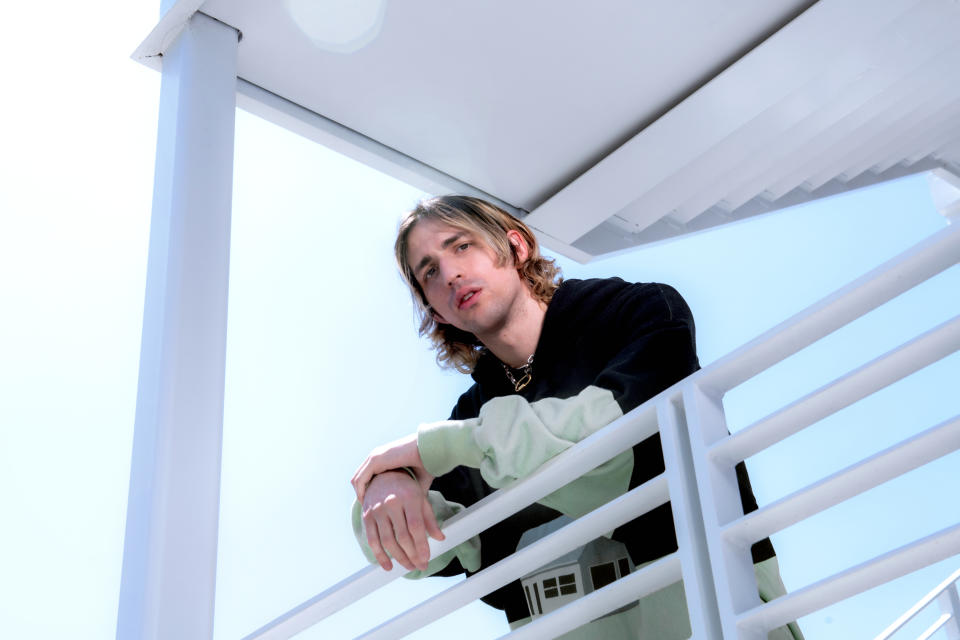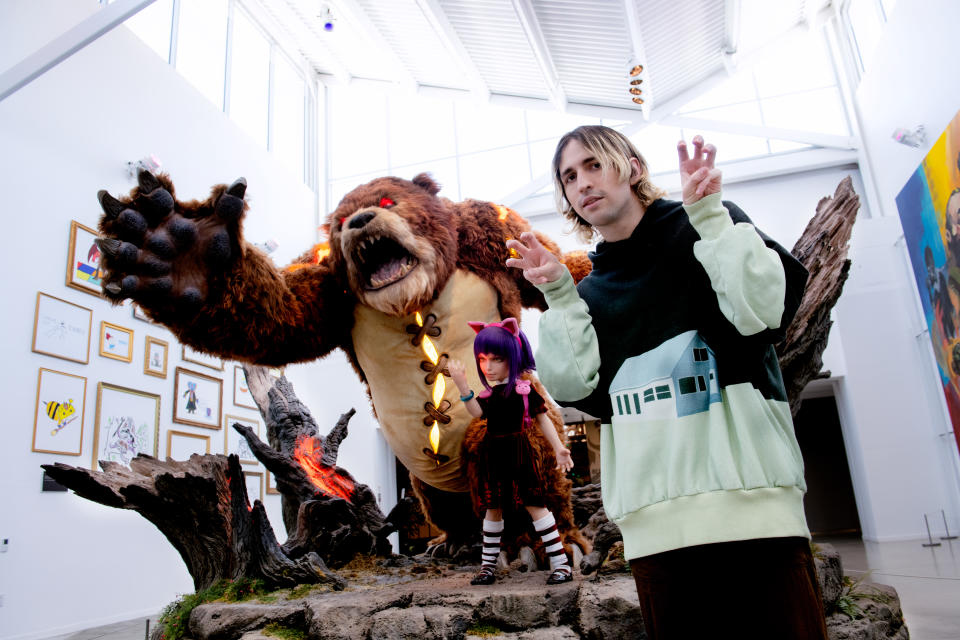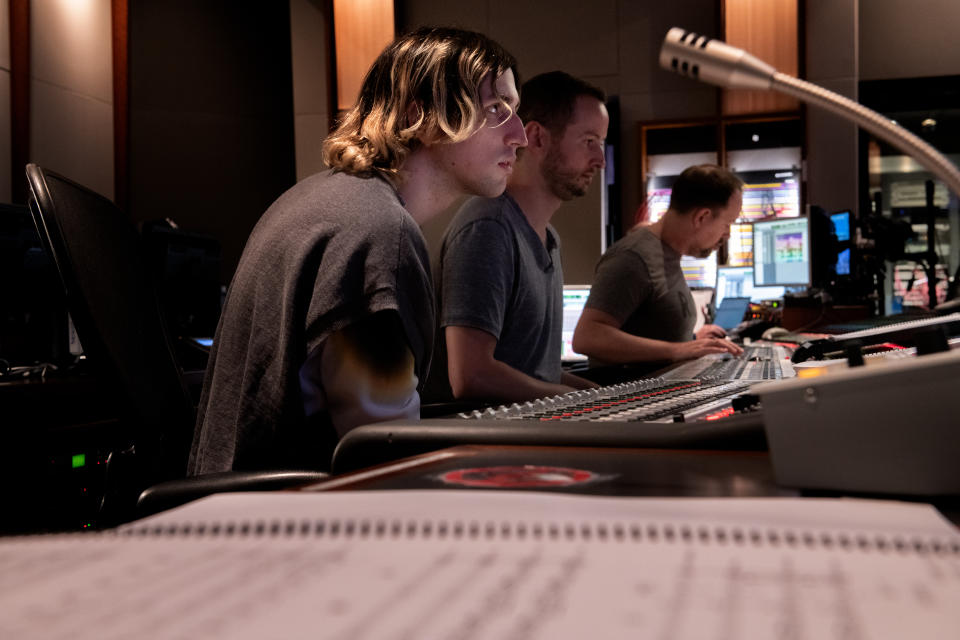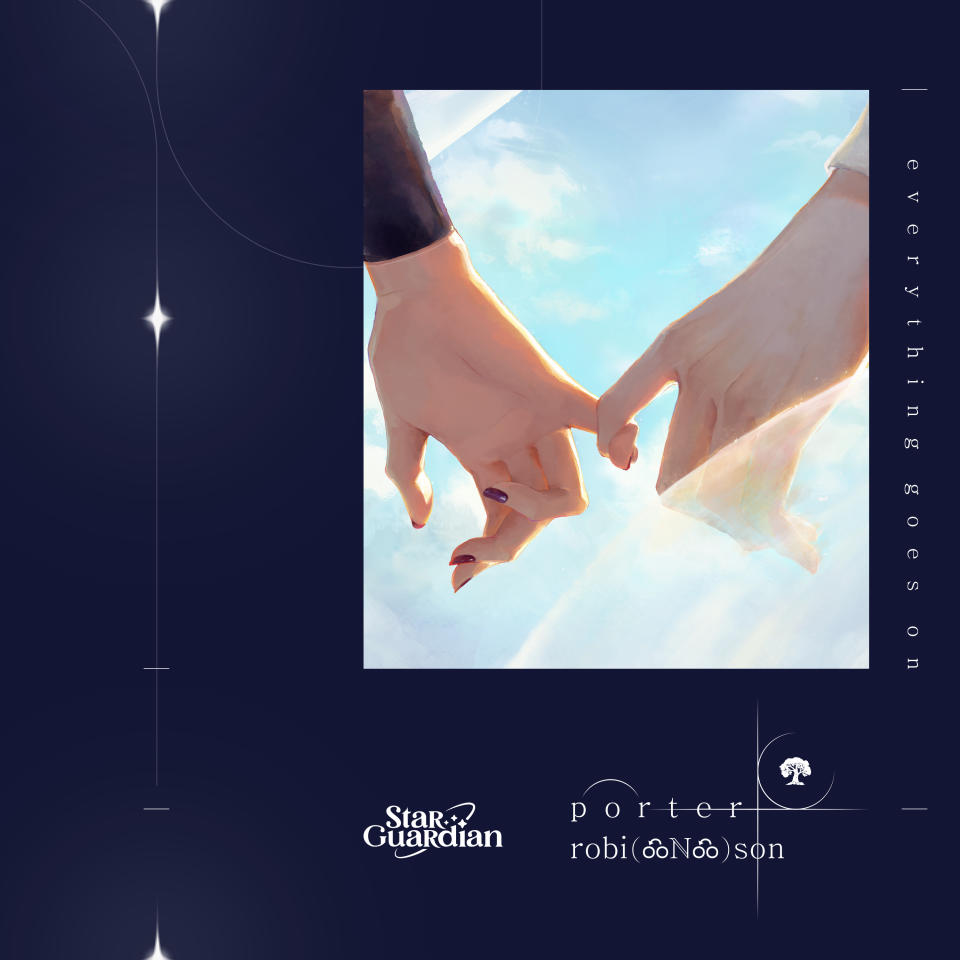Porter Robinson Muses on Grief, Authenticity of the Nostalgic Self In New Song for Riot Games

- Oops!Something went wrong.Please try again later.
Porter Robinson swears he’s not a nihilist. That’s not to say his latest single, “Everything Goes On“, made for Riot Games’ global Star Guardian event, isn’t a poignant and heartfelt musing on grief and abandonment. It just also happens to be presented through the lens of the bond between supernatural, all-powerful magical girls.
Making its return after three years, Star Guardian is League of Legends‘ tribute to the magical girl (mahō shōjo) anime genre, a vibrant alternative universe game centering on a young cast of characters who navigate school relationships by day and the responsibilities of magical warriors at night. The Star Guardian event kicks off Thursday, July 14 with a new song and music video release of the event anthem “Everything Goes On” by Porter Robinson. The even will also see new content releases in “League of Legends”, “League of Legends: Wild Rift”, and “Legends of Runeterra”, and the launch of “Sessions: Star Guardian Taliyah” and the Star Guardian merch line.
More from Rolling Stone
Trouble Finding Local Job Candidates? Here's Where to Post Job Openings for Local Roles
RS Recommends: Paramount+ Offering Free Month of Streaming as Part of Summer Promo
The Grammy-nominated artist was already a fan of League, having spent the pandemic posted up on Discord playing with his friends and fiancé, Rika, he told Rolling Stone. Following the release of his latest album Nurture, Robinson immediately knew the collaboration was meant to be when he wasn’t expected to write an “EDM banger”, and the result ended in a definitively “Porter” song. “Everything Goes On” will be available to stream on all major streaming platforms, with the music video premiering on YouTube on July 14.

Lindsay Ellary
Robinson, who wrote, produced and sang on the track, dug deep when telling the story of two Star Guardians in “Everything Goes On”, each independently coming to terms with their loss and finding the will to move on with their new comrades. Like the transformations so common to the genre, the lyrics were worked and reworked again, until the song expanded into a reflection on what it means to be a “mortal being, and to be in love”.
Robinson spoke to Rolling Stone on the writing process of “Everything Goes On“, how he views authenticity as an artist, and the addictive nature of nostalgia.
How did you get into this collaboration with Riot Games, and why did they feel like the right partner for this event, given your previous work on Worlds and Nurture?
Well, it was actually my fiancé Rika who got me into League of Legends during the pandemic, then Arcane came out, which is their Netflix animated series. For me, I’d put it up there with Avatar: The Last Airbender in terms of Western animation that will really stand the test of time. So I actually approached Riot first, but they were like ‘well, we have this other thing for you that would be happening a little bit sooner that we really think you’d be perfect for.’
They knew my music super well, and they weren’t going to ask or expect me to do something that isn’t what I do anymore. I just didn’t know. Maybe there’d be an expectation I was going to make an “EDM banger” or something. And it was totally not that at all. Everyone there said, ‘no, we want you to do a Porter song’.”
I’m the kind of person that’s a little scared of like getting committed to work like that, because inspiration is not something that I can force, and it’s a really big struggle for me at times. So I was like, let me just see if I can just put together the absolute basics of an idea this week, the first week, and we’ll see how long I can go from there. I started the initial little melodic loop that eventually became “Everything Goes On”, and then I just felt like the horses were off to the races.
You mentioned it’s more like a “Porter” song versus an “EDM banger”. How would you define a “Porter song” now?
One huge difference is that I’m really focused on lyrics in a way that I was not in the past. I used to feel like lyrics were just one of a few pink colors in the arsenal. As time went on, I was understating the ability of raw language to convey meaning and poetry, and move people. I felt like I had more and more than I wanted to say. I definitely had moments with [“Everything Goes On”] where I just kept pushing back and pushing back on when I would submit it, because I kept reworking the lyrics and they kept tweaking them.
The song was partially done with me on the guitar, which is just a different workflow for me. I would just try to go over the same lines a thousand times until something came to me that I felt really cut to the core of it. I think when people hear that I spent the majority of the effort on lyrics, they might expect really intricate wordplay, or really complex metaphors. That’s what people imagine when they think of effortful lyrics. But for me, a lot of it is trying to just be as honest as possible, and to put things in simple, everyday language.

Lindsay Ellary
Riot describes Star Guardian as “showing the importance of friendship, but also celebrating an authentic representation of oneself”. Your last album, Nurture, grappled a lot with identity and authenticity, such as on “Musician” and “Trying to Feel Alive”. So how do you view authenticity as an artist? What does it mean to you at this point in your career?
To me, sincerity is something that can easily be sniffed out, and authenticity is something that people have a sort of sixth sense for. People are really attuned to when someone is being dishonest, or when they’re lying. That comes through in art and in music.
For me right now, authenticity means that I don’t want to ever treat music or art as an obligation. I always want it to feel like something that I am behind 100%. I’ve been reflecting recently on the idea of something being sing-worthy — something that comes up on my mind a lot when I’m writing lyrics is, ‘is this thing that I’m talking about right now important enough to deserve music, period’? Does this idea, this lyrical sentiment, inspire enough passion in me that I would burst into song while writing it? If I’m going to write music, I don’t want it to just be statically emotional, you know? I want it to be heartfelt, always.
Over the course of my my career as an artist, it’s something that’s come up again and again in my relationship to my audience. I think it’s dangerous to try to cater to people’s expectations. I really idealize these nostalgic video games, for example, that I spent hundreds and hundreds of hours playing. And when I go back to them now, they retain my interest for about an hour and a half. And I still love them. I understand why I loved them initially, but they don’t grip me in the way that new things do.
I think it’s a mistake and a kind of pitfall for artists to bow to people’s demands. Sometimes audiences will want artists to try to make them feel the same way that their first record did. I think that’s actually literally impossible. I’m not the same person that I was. You’re not the same person you were. Everything is different now and the music should reflect that. So that’s a big part of authenticity to me, too.

Lindsay Ellary
In that same way, I think a lot about the ways that you approach both nostalgia and futurism in your work. How do you reconcile those two aesthetics when you’re creating art?
In the past, my music was really, really, really focused on just expressing love for nostalgia. I see it as a little bit of a drug, and I felt like I was under its spell a lot of the time. Trying to find the elements of art, music, and video game history that had since fallen out of fashion, but were too recent to be considered lo-fi, and show those to people again in a new light.
With my first album, Worlds, I was using a lot of N64 sound fonts at the time, and there were other artists doing that, but it was still a new thing. The element that people would associate with the sound of video game music would be 8-bit, or 16-bit tunes, and I wanted to try to use those elements from a more recent kind of nostalgia. The side project I did called “Virtual Self” in 2015 was when I first had the inkling of that idea. I was reflecting on rhythm games and JRPGs, and I was like, ‘man, there’s this turn of the millennium cyber aesthetic that I feel is going to be really important in a few years, in both design and in music’. I wanted to show my favorite version of that — for example, I was really inspired by this design trend that was popularized by these books called MetalHeart Is Movement, which did super ethereal cyber Y2K graphics through trance music.
Of course, all these things were already in the zeitgeist. Even in 2015, they were. Now, I went to a coffee shop the other day and I saw a group of 13-year-olds that were all Y2K, decked out to the nines. It was like the default. Even at the time that I was making that project, I felt like I could time the nostalgic comebacks with a stopwatch.
It feels like a 10-, 15-year cycle.
Right? The first question I started to ask myself was, ‘what’s the point of doing this if it’s kind of inevitable?’. For me, the point was that before this idea of what Y2K is becomes fully developed in the public consciousness, I wanted to write a love letter to the elements that I found really beautiful, interesting and valuable at the time. We have the ability to affect how the past is remembered, and it’s a really important power. A major aspect of making nostalgic art is that there’s a certain amount of curation involved.
More recently I’ve been reflecting on nostalgia and thinking of it a little differently. I’m recognizing the pitfalls of the thing that I love so much. Nostalgia has a really, really intense, but short-lived band of emotion. The half-life is really short. I find novelty a little more meaningful right now than nostalgia, because I think a lot of the things that I’m nostalgic for themselves were trying to be new at the time. They weren’t trying to be stodgy.

Riot Games
I can relate, as Star Guardian, as a tribute to the mahō shōjo genre, is nostalgic for a kid like me who grew up in the mid-2000s watching anime on YouTube. What elements from the game, or the genre, had the most influence on “Everything Goes On?
The very initial idea for the lyrics of “Everything Goes On” was telling a story, this Star Guardian headcanon basically, about what this entry into the magical girl genre would mean. It was really inspired by Madoka Magica, a magical girl anime from a few years back that was definitely a darker take on the genre, with some amount of extreme violence. It showed the horrible downsides of what that life as a magical girl might be like. So I had this story in my head where when you become a Star Guardian, part of the deal that you make to become this supernatural, powerful being, is that the people who know you and love you will basically just forget that you ever existed.
This song was initially written from the perspective of that last night, where the singer knows that in the morning, the person they love will have forgotten all about them, and they’ll be gone without a trace. And what that last night together would be like. You can definitely still hear that in the lyrics. But with time, it became much more about what it means to be a mortal being, and to be in love. What it means to know that you and the person that you love will die, and coping with loss and grief.
That reminds me a lot of both “Blossom” and “Sweet Time” off of Nuture. This idea that there’s only so much time that we have left with the ones that we love, so it’s better to enjoy that time and stay in the moment rather than push them away.
This is clearly something that just keeps coming up for me. One difference between “Everything Goes On” and the other songs, is that “Blossom” and “Sweet Time” are, for me, this pure expression of doe-eyed love where they’re imagining grief as a future problem. Whereas, with “Everything Goes On”, it made me reflect on the commitment of love in a really different way.
For a lot of this song, I was writing from the perspective of if I actually knew that I had a year to live. The imagery that I had in my head when I wrote the first and second verse were those kinds of conversations that would happen in a hospital room. Like with the first verse: ‘you were staring out the window, and I said, I want to take you to the sea’. Like, I want to get you out of here. And when I’m better, we’ll do everything. Then you’re like, ‘damn, I’ve got to stop making promises I can’t keep’. It’s about how I’ve always thought those conversations go. Then there’s the cute little ribbon on the end with the second verse where it goes, ‘I’ll just bring the sea to you’. You just try to make things as good as possible for somebody who’s suffering, while they’re suffering.
There’s a kind of a fallible narrator, in the sense that the chorus says, ‘you know, it’ll be easier if you just forget all about me’. I don’t really believe that that’s the best way to deal with grief right now. To pretend that it won’t happen, or to treat the time you do have with somebody as though it doesn’t matter.
I’m really not a nihilist [laughs]. I really believe that every day that we have to be alive on this planet is meaningful and important. And the time that we can spend with our loved ones is a total miracle. So the best way I could end the last pre-chorus was to say, ‘thanks for sticking with me when I was so lost, and when I thought that this was the way. Thanks for not listening to me when I told you to forget’.
Best of Rolling Stone

